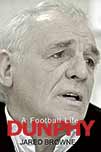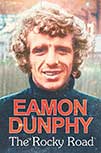 A football life
A football life
by Jared Browne
New Island, £14.99
Reviewed by Jonathan O’Brien
From WSC 307 September 2012
Buy this book
At some point in the next few months, we can expect Eamon Dunphy’s memoirs to emerge, a publishing event that is equally likely either to break all Irish bookselling records or sink without trace, so starkly does he polarise opinion in his native land. In the meantime, Jared Browne has stepped into the breach with this diligent but narrowly focused biography of the ageing controversialist.
Dunphy: A Football Life arrives at a moment when, for the first time, the omnipotence of Dunphy’s double act with John Giles on RTE’s football coverage is being openly questioned. Regarded since the mid-1980s as gods of football analysis, they are now frequently accused of laziness, poor preparation and excessive smugness. This isn’t touched upon here, however. Perhaps Browne knows that to have done so would have removed a large part of the rationale for doing the book at all.
As well as being the best-paid journalist in Ireland (he made half a million euros last year), Dunphy is also the most notorious, with a life history speckled by drug use, numerous drink-driving convictions, poisonous running feuds and bully-boy political columns in a Sunday newspaper. But none of that, other than his temporary estrangement from Giles around the 2002 World Cup, is mentioned here. It’s football and football only.
This means that we’re left with a fairly colourless read, albeit a reasonably well-written one. Browne spends too much of this book pushing up the word-count with lengthy digressions on Roy Keane’s managerial career, Jack Charlton’s dinosaur tactics and the inadequacies of the BBC’s pundits. A couple of woeful mistakes slip through the otherwise generally meticulous research: Ireland lost 2-0, not 2-1, to Holland at USA 94, and scored 130 goals, not 75, during Charlton’s decade at the helm.
Browne is no sycophant towards his subject, who he correctly accuses of often self-sabotaging strong arguments by going embarrassingly over the top. But some of his own stances seem a little perverse themselves. There’s a lengthy onslaught on the footballing deficiencies of Mick McCarthy, who Dunphy derided as a player and hated as Ireland manager. Browne goes to the lengths of unflatteringly comparing the man to Paolo Maldini and Fabio Cannavaro, which is hardly fair. Yet Ireland conceded a mere 17 goals in 30 competitive matches with McCarthy in the side, so he must have been doing something right.
At times, adopting an overly formal tone (“Stephen” Staunton, “Josep” Guardiola), the book feels more like an academic paper than a conventioal biography. Browne writes in one not untypical passage: “We must take these concerns seriously and put Dunphy’s views to the test. Was Charlton’s coaching fundamentally flawed and was there a better way for Irish football at this juncture?”
Here and there, the book that instead might have been realised comes bobbing to the surface, not least when Browne correctly and perceptively identifies the “old Ireland v new Ireland” nonsense of the Saipan summer as the pop-psychology drivel that it was. But there’s not enough material like that and, instead, too much aimless strolling down blind alleys, like a very long blog post that’s got way out of hand.
Buy this book
 by Eamon Dunphy
by Eamon Dunphy A football life
A football life
